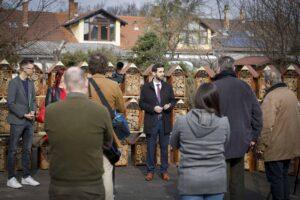More than 50 insect hotels support children’s environmental education
It is worth starting to shape attitudes among the youngest age group, said Bertalan Balczó at the presentation of the insect hotel project realized within the framework of the Green Danube Bend Program on Tuesday in Vác. The Deputy Secretary of State responsible for nature conservation of the Ministry of Agriculture drew attention to the importance of protecting pollinators and the importance of environmental education in connection with the completed more than 50 insect hotels, which are placed in kindergartens in the region.

(Photo: AM/István Fekete)
Bertalan Balczó drew attention to the fact that nowadays the protection of pollinators is especially important, as their stocks are threatened by drastic and accelerating changes in the natural environment, the disappearance of habitats, environmental pollution, the appearance of invasive species, and climate change. He emphasized that the diversity of nature holds the potential for species that are able to find their habitat conditions even in the midst of changes to survive, maintain functioning ecosystems and provide us with the services that are essential for our everyday lives. Expressing the importance of pollinating species, the deputy state secretary emphasized that about 80 percent of wild plants and crops depend on these pollinator species. Evaluating their importance from an economic point of view, it can be concluded that the annual agricultural production in the European Union is directly dependent on pollinating insects in the amount of 3.7 billion euros. At the same time, in recent decades, the occurrence and diversity of wild European pollinating insects, including bees, moths, buzzards and moths, has decreased significantly in Europe, and this trend can also be observed in Hungary. In the European Union, pollination is deficient on 50% of the land cultivated with plants that depend on pollinators.
Part of reversing negative trends must be the formation of attitudes and the transfer of knowledge about biological diversity, which can lay the foundation for systemic changes
In order to achieve this, the environmental education of the youngest is also extremely important, in which the creation of these more than 50 insect hotels is an important step in the region – Bertalan Balczó praised the project. He added that the government can promote the survival of these species primarily through the regulation of land use and support systems, with means such as the cultivation of agricultural land in a nature-friendly manner, the preservation of meadows and edge habitats, and the restoration of green infrastructure elements important from the point of view of pollinators. The deputy state secretary emphasized that the biodiversity conservation strategy until 2030 adopted by the government in 2023 pays special attention to the protection of pollinators. The specific objective of the strategy is to assess the situation of pollinators, to stop population reduction, to maintain and restore pollination as an ecosystem service, which requires a complex package of measures that requires cooperation across sectors.
AM
Related news
State compensation for the victims of Bászna Gabona Zrt. has been completed
🎧 Hallgasd a cikket: Lejátszás Szünet Folytatás Leállítás Nyelv: Auto…
Read more >József Viski: Adaptation and competitiveness are key for the horticultural sector
🎧 Hallgasd a cikket: Lejátszás Szünet Folytatás Leállítás Nyelv: Auto…
Read more >In 2025, FruitVeB considered the support and professional coordination of the TÉSZs as its priority task
🎧 Hallgasd a cikket: Lejátszás Szünet Folytatás Leállítás Nyelv: Auto…
Read more >Related news
Two million people have already voted, so 57 million forints will be given to locals in 125 settlements, courtesy of Tesco
🎧 Hallgasd a cikket: Lejátszás Szünet Folytatás Leállítás Nyelv: Auto…
Read more >









